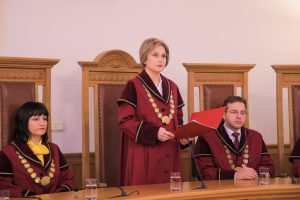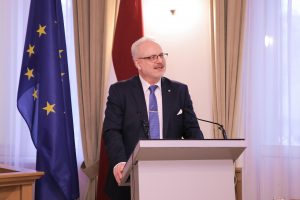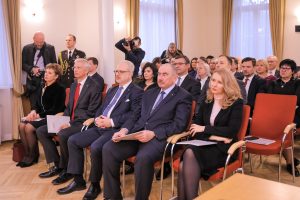Human dignity and rule of law highlighted at the solemn hearing for the opening of the Court’s judicial year
On Friday, 10 January, the solemn hearing of the Constitutional Court was held for the second time, during which, in the presence of officials from all branches of the state power, the new judicial year of the Constitutional Court was opened symbolically. The solemn hearing was opened by President of the Constitutional Court Ineta Ziemele, who delivered a report on the relevant constitutional law issues in the light of the rulings passed by the Constitutional Court in 2019. A report at the solemn hearing was given also by the guest of honour – President of the State of Latvia Egils Levits.
Ineta Ziemele noted that the Constitutional Court, for 24 years, by its judicature had been creating a broader and more unified understanding of the Satversme – the legal framework, in which we live and develop ourselves and this State. She underscored that, in 2019, the Court had to specify several aspects of the content of human dignity and provide significant messages regarding compliance with the principle of good legislation.

President of the Constitutional Court Ineta Ziemele delivers a report on the relevant constitutional law issues in the light of the rulings passed by the Constitutional Court in 2019. Photo: Aleksandrs Kravčuks
Ineta Ziemele noted that the Constitutional Court had recognised human dignity and the value of each individual as the substance of human rights. Democracy and human dignity are interconnected values that reinforce each other, therefore those who exercise the state power should work to strengthen each person’s dignity and freedom. Moreover, it should be kept in mind that the principle of good legislation is one of the mechanisms that help to promote public trust in the State and law.
Ineta Ziemele emphasised that, in a democratic state governed by the rule of law, ways for protecting the rights of each individual, safeguarding human dignity and freedom, should always be sought for, at the same time ensuring also the common good of society in general, striving towards sustainability of the people and the State. She admitted that such solutions demanded everyone to assume responsibility and called for solidarity. It requires each constitutional body to grow. Supervising the balance that complies with the Satversme is and will remain the main task for the Constitutional Court.

President of the State of Latvia Egils Levits gives a speech at the solemn hearing of the Constitutional Court. Foto: Aleksandrs Kravčuks
President Egils Levits highly appreciated the tradition introduced by the Constitutional Court to launch the judicial year with a solemn hearing with the participation of representatives from all constitutional bodies. He recognised this as being a European, modern and progressive tradition, complying with the legal culture. The report on the previous year, provided by the Constitutional Court, gives better insight into the topicalities, issues to be dealt with in the legal system as well as the most recent findings by the Constitutional Court.
In his presentation, President Egils Levits spoke about the rule of law. He underscored that the rule of Law was an indispensable element in Latvia’s constitutional identity. Latvia is a state governed by the rule of law, in which all constitutional bodies ensure that the principles of a state governed by the rule of law are implemented; however, in the final instance, this is ensured specifically by the Constitutional Court. The President also reminded that legal consciousness should be developed in society; i.e., all inhabitants of Latvia should act and live in a way that would make their actions compatible with the law.
President Egils Levits drew attention to four “enemies” of the rule of law: legal nihilism, formal application of law, law evasion, and abuse of law. He concluded his presentation by underscoring the importance of timely enforcement of the Constitutional Court’s rulings, reminding that this was one of the aspects belonging to the contemporary legal culture.

The guest of the solemn hearing of the Constitutional Court. Photo: Aleksandrs Kravčuks.
The solemn hearing was followed by a press conference, during which President of the Constitutional Court Ineta Ziemele, Vice-president of the Constitutional Court Sanita Osipova, Advisor to the Court’s President Inguss Kalniņš, Head of the Legal Department Alla Spale and Head of Public Relations and Protocol Department Ketija Strazda informed about the Constitutional Court’s work in 2019.
Ineta Ziemele provided information about the number of cases initiated by the Court and the number of examined legal norms (acts), emphasising the trend of increase in this. Last year, the number of applications examined by the Panels had been almost constant – 182 applications; however, compared to 2018, the number of initiated cases had increased by almost 40 %, and also the number of reviewed legal norms had increased. The constitutionality of 38 legal norms had been examined in the judgements, 23 legal norms had been recognised as being compatible, whereas 15 – as being incompatible with the Satversme.
Ineta Ziemele noted that the work accomplished by the Court, similarly to the previous years, could be compared to a scientific book, its volume amounting to more than 750 pages. In the reporting period, the Court has examined numerous and diverse issues of law, inter alia, it examined cases with respect to the right to education (No. 2018-22-01, No. 2018-12-01, No. 2018-23-03), the right to know one’s rights (No. 2018-10-0103, No. 2018-13-03), gender equality (No. 2018-25-01) and protecting the family’s rights (No. 2019-01-01).
Sanita Osipova focused on the extensive judicial dialogue that the Court was engaged in on the national, European and international level. On the national level, she highlighted the successful dialogue with the courts of general jurisdiction and emphasised the involvement of the Justices and Court’s employees in educating school students about the Satversme and values included in it. A competition of creative works for schools has been held for the third year in succession, and the Justices have lectured in schools. Valuable work has been done in cooperation with the official publisher “Latvijas Vēstnesis”, publishing the book “The Satversme of the Republic of Latvia. Findings by the Constitutional Court of the Republic of Latvia”.
Last year, the European- and international level judicial dialogue was developed with the Court of Justice of the European Union, the European Court of Human Rights, the International Court, the Constitutional Courts of Austria, Armenia, Belgium, Czechia, Lithuania, Slovenia and Germany, as well as with the Supreme Court of Estonia, and the highest court instances of France and the Council of the State. Sanita Osipova underscored that the cross-border dialogue was important for sharing experience, discussing relevant matters and gained insight into the legal issues reviewed by other courts.
Alla Spale informed about the State ensured legal aid, which, starting from 1 January of the last year, had become available also for the legal proceedings before the Constitutional Court. During the reporting period, the State ensured legal aid had been requested 12 times, in two cases an application to the Constitutional Court had been prepared, cases were initiated on the basis of both these applications. She reminded of the availability on the Court’s homepage of the informative material prepared by the Court – “Recommendations for Drafting a Constitutional Complaint”.
Ketija Strazda, in turn, spoke about several communication activities implemented in 2019 for public awareness raising. Last year, the Constitutional Court made publicly available the database of the Constitutional Court’s judicature, developed in the course of several years, offering systematised most important findings from the Constitutional Court’s rulings and the Justices’ separate opinions. Moreover, since the middle of the last year, the Court also provides the opportunity to use the Court’s collection of books and publications.
Ketija Strazda noted the continued cooperation with the creative team of “Latvijas Vēstnesis”, which had resulted in 9 created and launched videos, in which Justices informed about the judgements that had been delivered. A novelty is communication in the social network Twitter, which the Constitutional Court started, with the account @Satv_tiesa.
The presentation given by President Ineta Ziemele at the solemn hearing of the Constitutional Court in Latvian is available here: https://www.satv.tiesa.gov.lv/articles/satversmes-tiesas-priekssedetajas-ineta-ziemeles-uzruna-satversmes-tiesas-svinigaja-sede/
The presentation given by President of the State Egils Levits at the solemn hearing of the Constitutional Court in Latvian is available here: https://www.satv.tiesa.gov.lv/articles/valsts-prezidenta-egila-levita-runa-satversmes-tiesas-jauna-gada-atklasanas-svinigaja-sede/
Video recording of the Constitutional Court’s solemn hearing in Latvian is available here:
https://www.youtube.com/watch?v=TbMiEmvc8Vo&feature=youtu.be
Video recording of the press conference in Latvian is available here:
https://www.youtube.com/watch?v=Bs_iQi1biiM
An overview of the Constitutional Court’s work in 2019 in Latvian is available here: https://www.satv.tiesa.gov.lv/blog/2020/01/10/parskats-par-satversmes-tiesas-darbu-2019-gada/
Photos from the solemn hearing and the press conference are available here: https://www.satv.tiesa.gov.lv/envira_/satversmes-tiesas-sviniga-sede-10-01-2020-foto-aleksandrs-kravcuks/



